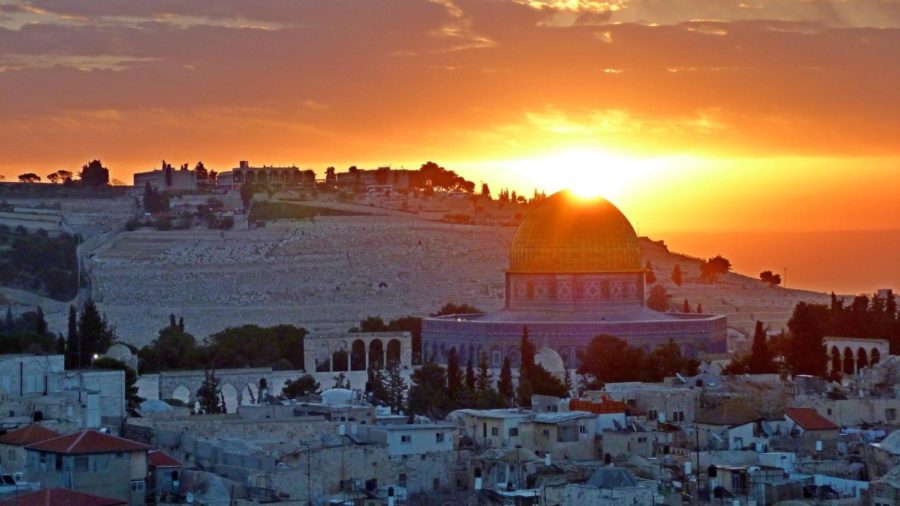The Holy Land
Before World War One, the Ottoman Empire had ruled over the land where Israel and Palestine currently reside. The area was inhabited by Arab Muslims, Christians, and Jews. Shortly after WWI, in 1920, the British occupied the Holy Land, naming it the “Palestine Mandate.” In the League of Nations, the British created a predominantly Arab state, which enraged many Jewish leaders worldwide. However, the British were only fulfilling their mandated agreement in the League of Nations. In the 1930s, conflict had erupted all across Asia. The invasion of Manchuria, in Northeast China, 1931, prompted military alliances all across Europe and Asia. Meanwhile, the British still largely occupied Palestine, maintaining the established Arab state of Palestine. World War II came onto the horizon, causing intense conflict throughout the world. The Holocaust led to the mass genocide which killed over 8 Million Jews and other ethnic groups in Europe. Many Jewish Europeans moved to Palestine in the wake of the Holocaust; such migrants were called Zionists, which prompted motivation for a new state to be established, Israel. In 1948, the United Nations established the state of Israel in the Holy Land. Such precedent is what birthed the intense conflict between Palestine and Israel.
Conflict
The conflict between Arab Muslims and Jews in the Holy Land has occurred for hundreds of years. However, in recent decade conflict has escalated. Post the creation of Israel; a war occurred between the two states, Palestine and Israel. The 1948 Arab-Israel war was the first major conflict between the two states. It catalyzed the constant tension between Palestine and Israel, which continues in the 21st century. Due to the war, and Israel instituting policies that forced the ousting of native Palestinians, over 500,000 Palestinians were forced to migrate to other nations around Palestine and Israel. Such actions separated thousands of families and put pressure on the Palestinian government to take action. Nevertheless, the Palestinian government could not take drastic action due to Israel’s backing from the United Nations, forcing Palestine into a dire situation, looking for aid from its neighbors. More conflict arose from 1950-1967. A violent period known as, “The Six-Day War,” where Palestine allied with Egypt to overthrow the Israeli government. However, the effort failed, with Israel pushing back against Egypt and Palestine. In the 70s, more violence between the two occurred. The Yom Kippur War in 1973 pushed back Palestine and Egypt, giving Israel control of the Sinai Peninsula for over 15 years. Such territorial push-backs have constantly occurred between Palestine and Israel, even in the 21st century. The end to such madness may never come.
Present Day
In May 2021, extreme violence erupted in the Holy Land. Israeli forces had sent missiles into the Gaza Strip and the West Bank repeatedly in return for Hamas’s missiles into mainland Israel. The violence between the two states in May 2021 drew mass media attention and daily militarized violence, pushing both sides towards possible war. Such a scenario occurred in 2013 as well, with the siege on Gaza from both sides. Israel and Palestine will continue to experience violence and political instability if they do not create a compromise. For years, the Prime Minister of Israel, Benjamin Netanyahu, has stated his lack of cooperation with Palestine. Such actions have divided Israel and Palestine further. However, a compromise between the two nations may finally occur. An opposition political coalition in Israel has gained enough power and members to remove Netanyahu from power officially. His removal from power may create feasible relations between Palestine and Israel. Something which both sides have needed for years. The Palestinian Government as well has been at the front of violence in the Holy Land. Currently, Hamas, a Political party in the Gaza Strip, controls the Gaza Strip’s primary military operations. Hamas took control of the Gaza Strip in 2007, establishing a militarized state where locals and foreign military personnel have seen extreme violence. Citizens in Gaza have attempted to speak against Hamas; however, they have been suppressed. Such public suppression has created extreme political dysfunction, violence with outside states and Israel; additionally, an unwillingness to cooperate with Israel and other political parties in Palestine and the Gaza Strip to create stability and peace in the Gaza strip and the Holy Land. Nevertheless, the violence between both states will not stop unless either side stops, whether it would be Palestine or Israel. For such to occur, cooperation needs to occur.
For centuries violence has raged in the Holy Land. Palestine and Israel have faced their issues entirely, politically, socially, and economically. For decades the constant wars, violence, and sieges on one another have divided the entire world, on Palestine and Israel. However, in recent days, such may be the end, as Israel’s current Prime Minister is on the way out, which may create an era of compromise, two fair states, and stability in the Holy Land.

